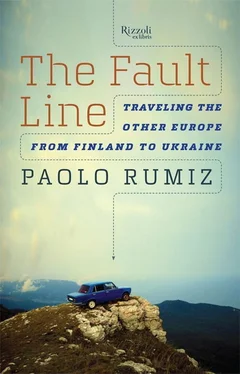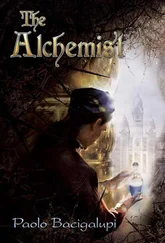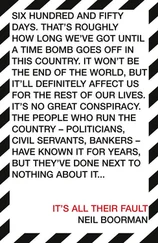Odessa! After thirty-six hundred miles of hinterland, the city calls out to me with the imperious name of an opera singer. It’s the perfect embarcadero, the head of the line of the ferry that will take me to Constantinople, which in turn is the departure point of the train that will take me across the Balkans to Trieste, following the route of the Orient Express in reverse.
I’m not the only one in the compartment who’s awake. In the other upper bunk there’s a businessman from Kiev who never stops talking on the telephone, but his conversations are all drowned out by the clamor of the rampaging train: jolts, lurches, thumps, on the brink of a crash. In the darkness, the engineer searches for the sea as though hypnotized by the compass needle stuck on southeast, venting all the claustrophobia of this vast featureless landscape that is the Other Europe. The summer night is teeming with long-distance trains, glowing caterpillars heading south, to the tune of seventy or eighty hours of travel time, standing-room-only trains from Murmansk, Omsk, Yekaterinburg, and Baku.
What an adventure. And what encounters! A giant-crab fisherman and buxom vendors of blueberries and sour cream, a special-forces Rambo in Chechnya now turned priest, and a tenant couple living in a former synagogue turned into a barn by the Nazis. I’ve met a reindeer herder engaged in a desperate war against Putin’s Gazprom, and a writer named Wolf in a solitary house amid the lakes in the wilderness of Karelia, north of Saint Petersburg. I’ve crossed paths with smugglers and submariners, young coast guard officers freshly promoted to be commanders of rust buckets in the frozen seas of the North. I’ve seen a bunch of women on a train sticking packs of DVDs to their thighs using Scotch tape as garters, and walking by a river, I met an old woman named Lyuba with three goats on a leash who told me her version of Genesis. In Ukraine, I looked on as a pack of thugs beat up a taxi driver who refused to pay for protection, and in a restaurant in Belarus, I watched the unbridled dancing of twenty young hairdressers, beautiful and happy to be there without men.
The heat is oppressive. The Podolsky Express is a Soviet rattletrap, hermetically sealed to prevent drafts and imbued with the stratified odors of generations of travelers. As a consequence, the doors to all the compartments are kept wide open to capture all the available air from the tiny windows along the corridor, the only ones that open. I exit the compartment into a billowing swirl of coffee-colored curtains; the train has been invaded by spirits sucked in from the surrounding countryside—Galician rabbis, Moldavian farriers, Polish cavalry squadrons, Gypsy violinists, Muscovite police commissars, and boatmen from the Dnieper. I try to walk straight but the jolts are too powerful. Direct lateral hits, as if a mallet were battering the side of the train. My face grazes the pairs of feet sticking out of the bunks, women’s feet, children’s feet, the feet of grown men and old codgers, Russian feet and Ukrainian feet, bare or with socks, all pointing out into the air, then I manage to grab onto the air vent and fill my lungs with fresh air. The night is hot and smells of grass; Ukraine is a warm mother.
Under the bunk is my luggage space with my backpack and shoes. That’s all I have. Fifteen pounds of luggage, and it could have been less. I’ve traveled on trains, buses, ferries, and barges; I’ve traveled on foot and hitched rides. On some occasions I’ve regretted this decision—Rumiz, who was it that convinced you not to travel by car?—but I’ve always managed somehow, and I’ve always met someone who has been happy to lend me a hand. My state of need has made it easier for me to understand the human temperature of the places I’ve visited; the hardships have become stories, and the journey has worked itself out without my needing to plan anything at all. I started out lame from a recent fracture of my right foot, walked in pain for miles and then, after meeting a monk in the Solovetsky Islands, threw my cane into the White Sea, betting that I would make it. That has become a story, too.
The Slavic people of the East have big souls. To be treated as a friend, all I’ve had to do is be seen, with my Western appearance, as I get off the train with my white beard, backpack, and uncertain step. “Where are you going?” they ask me. “Where do you come from? Why aren’t you traveling like a tourist? Aren’t you afraid of riding on Russian trains?” All I’ve had to do is tell them I’m Italian, I’m going to Istanbul, and I’m not the least bit afraid of Russian trains, and the welcoming machine is set in motion. It begins with an invitation to tea, then the tea turns into dinner, and the dinner becomes an offer of a bed for the night.
Exhausted, Monika is asleep in the other lower bunk. In her backpack, shut inside her luggage space, are a hundred or so rolls of film. She always sleeps like a rock, but tonight her sleep is especially deep. She’s been doing the work of three people. Photographer, Russian interpreter, interviewer—tasks she’s able to perform simultaneously. Without her, I wouldn’t have seen half of what I’ve seen. I wouldn’t have met old Lyuba and her goats, wouldn’t have received the confidences of a young Russian lad from the North just released from a forced-labor camp, would never have realized that a private home in easternmost Latvia was actually a former place of Jewish worship, with its basement still full of holy books, forgotten amid cigarette butts and shards of shattered glass.
I am heading into the Mediterranean night, the black night of the Black Sea, crossing the black lands of Ukraine, and in the forest of exchanges, I recite like a litany all the different shades of negritude. Karadeniz, Chorne More, chernozyom , ochi chorniye . [1] Karadeniz is the Turkish name for the Black Sea; Chorne More, the Ukrainian name; chernozyom means “black earth” in Russian; ochi chorniye means “black eyes” in Ukrainian, but is often translated “dark eyes” or “brown eyes” so it doesn’t sound like the result of a fistfight.
The darkness—what a marvel, the darkness after the overdose of light in the North; and what a blessing to imagine the sun going down into the sea while the tavern keepers of Odessa, Smyrna, and Istanbul, all aligned on the same longitudinal meridian, spread out white tablecloths on outdoor tables to the sound of pots and pans coming out through the windows of their old buildings. Lights, smells, prairies, and torrents have marked the segments of this journey on the edge of night, but more than anything else, it’s trees that have punctuated our progress southward. First the birches, then the lindens, then the oaks, then the vineyards, then the plane trees, and then the fig trees. I’ll never be able to forget the emotion of my encounters with my first linden tree and my first horse chestnut tree in Estonia. I said their names out loud like the name of a long lost friend.
I could have gone from south to north in order to avoid extreme temperatures and let the progress of spring and summer attenuate the rigors of the North. I chose to do the opposite, to use the calendar to extend the latitude. In this way, instead of thirty parallels, it’s as though I’ve crossed fifty, and instead of one month, I’ve lived three, the ones that come between the end of winter and the beginning of summer. It snowed in Murmansk, just a month ago, and in order to cope I had to put on all my clothes in layers. Now I’m dripping with sweat as if I were on the outskirts of Calcutta. I realize that in this past month, I’ve seen unfold right before my eyes an unimaginable range of scenic backdrops. Frozen lakes and fields of grain, cold forest dawns and sultry Southern nights. A “vertical” journey that has dragged me toward the lower realms of the globe almost by force of gravity.
Читать дальше












